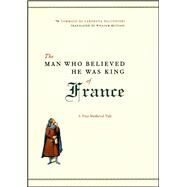The Man Who Believed He Was King of France: A True Medieval Tale
, by Di Carpegna Falconieri, Tommaso- ISBN: 9780226145259 | 0226145255
- Cover: Hardcover
- Copyright: 9/15/2008
Replete with shady merchants, scoundrels, hungry mercenaries, scheming nobles, and maneuvering cardinals,The Man Who Believed He Was King of Franceproves the adage that truth is often stranger than fictionor at least as entertaining. The setting of this improbable but beguiling tale is 1354 and the Hundred Years' War being waged for control of France. Seeing an opportunity for political and material gain, the demagogic dictator of Rome tells Giannino di Guccio that he is in fact the lost heir to Louis X, allegedly switched at birth with the son of a Tuscan merchant. Once convinced of his birthright, Giannino claims for himself the name Jean I, king of France, and sets out on a braveif ultimately ruinousquest that leads him across Europe to prove his identity. With the skill of a crime scene detective, Tommaso di Carpegna Falconieri digs up evidence in the historical record to follow the story of a life so incredible that it was long considered a literary invention of the Italian Renaissance. From Italy to Hungry, then through Germany and France, the would-be king's unique combination of guile and earnestness seems to command the aid of lords and soldiers, the indulgence of inn-keepers and merchants, and the collusion of priests and rogues along the way. The apparent absurdity of the tale allows Carpegna Falconieri to analyze late-medieval society, exploring questions of essence and appearance, being and belief, at a time when the divine right of kings confronted the rise of mercantile culture. Giannino's life represents a moment in which truth, lies, history, and memory combine to make us wonder where reality leaves off and fiction begins.







